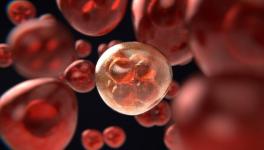Cancer Treatment may be Inefficient for Patients With African, Asian Ancestry
Image Courtesy: Science.Org
Widely-used cancer treatment may become inefficient for people of African and Asian ancestry, according to a new study, which implies that patients from these backgrounds are receiving the costly treatment without any benefit and could even worsen their conditions and prognosis. The new study has been published recently in Cancer Cell.
Sequencing the DNA from cancer tumours has become a routine practice nowadays. The purpose of this practice is to identify the specific mutations that have occurred in the cancer tumour. At this point, it is worth mentioning that DNA sequencing is a process wherein the order of the building blocks is found. The building blocks of a DNA are four chemicals that are denoted by four alphabets A, T, C and G. The sequence of these four letters in a DNA can be used to find what changes have occurred in a diseased condition, especially in cancers.
When the sequences of a cancer tumour are deciphered, then they are compared with the sequences with that of the normal condition or the non-diseased condition. With this comparison, it becomes clear what changes in the DNA have occurred to get into the disease. The changes in the DNAs are called mutations. Often, these mutations are non-harmful, but in some cases, they can give rise to as severe a condition as cancer. DNA sequencing techniques can help in finding out the mutations associated with a disease.
Again, finding the mutations associated with a cancer tumour can help physicians to decide on a particular treatment paradigm. It has been found from numerous clinical trials that tumours can have multiple mutations, what has been termed the tumour mutational burden (TMB). On the other hand, TMB responds very well to a special kind of drug known as an immune checkpoint inhibitor. The immune check inhibitor drugs instigate immune cells to unleash an attack on the tumour cells.
Remember, the human immune system or the defence mechanism can fight off invading pathogens (disease-causing agents like viruses, bacteria or fungi) and the tumours that develop within the body owing to DNA mutation.
The use of immune checkpoint inhibitors in a wide range of cancers is now a common medical practice in place. In a study published in 2021, it was found that the presence of a high level of TMB can predict how a patient would respond to the immune checkpoint inhibitor drug named pembrolizumab. This drug got US FDA approval later and can be used in lung cancer, melanoma and cervical cancer with a high level of TMB.
Till this point, everything appears fine. But the critical question here is how exactly to decide whether a patient has a high TMB or not. To understand this, we need to go back to the basics again, which has been explained briefly earlier. What doctors do is sequence the tumour DNA and then compare it with some reference genome or DNA sequences included in some standard databases. The genomes in the databases are the DNA sequences that have been compiled from thousands of people worldwide.
However, according to Alexander Gusev, the lead scientist of the Cancer Cell paper and a statistical geneticist at the Dana-Farber Cancer Institute, these databases used as references are not diverse.
As an example, the gnomAD database consists of DNA sequences from over 56 thousand European people, whereas it has slightly over 8 thousand sequences from Africans.
Gusev and his co-researchers aimed to find out whether this disparity apparent in the reference databases can impact decisions about TMB and hence the use of a cancer drug. They compared 3600 cancer samples that have sequences from a reference panel with the DNA taken from the patient's own healthy cells. In their analysis, the researchers found that when compared with the reference panel, the tumours from people of European ancestry have a TMB 50% higher than the actual amount. Patients who are not of European ancestry showed an estimated TMB twice their actual TMB.
Importantly, this disparity was found to be highest amongst African and Asian ancestry. If this is the reality, then doctors, in several cases, are prescribing costly anti-cancer drugs (like pembrolizumab), which may not help them at all. The researchers also found that a standard algorithm which is used in the comparison of disease and reference genomes produced more false positives amongst people from non-European racial backgrounds.
The researchers, going further, also applied a corrected algorithm to a smaller group of patients with lung cancer who received immunotherapy. They found that only the patients who really had a high TMB and with European ancestry could survive for longer. Importantly, as the researchers found, the immunotherapy was not fruitful in increasing the survivability of African or Asian patients having a true high TMB.
In a statement about the study findings, VamsidharVelcheti, an oncologist at New York University, commented as—”They’re not just saying that certain ethnicities will do poorly with checkpoint immunotherapy. They’re actually telling you exactly the mechanisms of why that may be the case.”
Gusev, on the other hand, argued that the ideal TMB test should contain a comparison of a patient's tumour DNA with his own normal DNA in place of a comparison to a reference genome. "Both doctors and patients need to be aware of these issues. Non-European individuals are already typically getting substandard care. This is just exacerbating those problems," Gusev said in a comment.
The racial disparity has also been shown in earlier research. For example, a review paper published in 2019 showed that in trials for immune checkpoint inhibitors, less than 4% of the enrolled patients are black.
Get the latest reports & analysis with people's perspective on Protests, movements & deep analytical videos, discussions of the current affairs in your Telegram app. Subscribe to NewsClick's Telegram channel & get Real-Time updates on stories, as they get published on our website.















